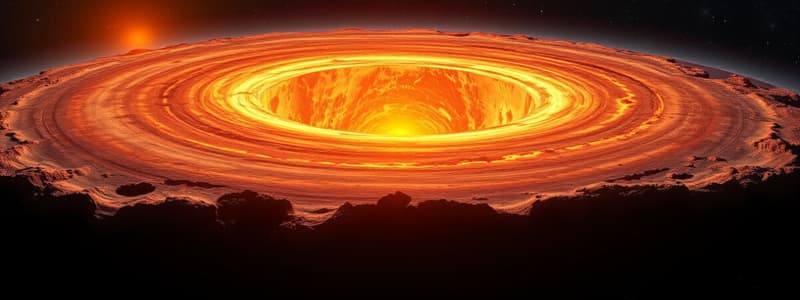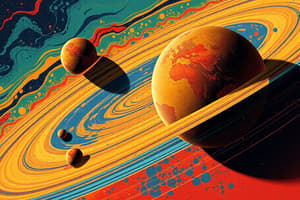Podcast
Questions and Answers
What does the Planetesimal Theory explain about the formation of planets?
What does the Planetesimal Theory explain about the formation of planets?
- Planets formed from hot gas condensing into solids.
- Planets formed solely from the gaseous material condensing.
- Planets originated from collisions between stars.
- Planets formed from solid particles through accretion. (correct)
Who provided the mathematical foundation for the Planetesimal Theory?
Who provided the mathematical foundation for the Planetesimal Theory?
- Harold Jeffreys
- James Jeans
- Thomas Chrowder Chamberlin
- Forest Ray Moulton (correct)
What is a primary drawback of the Planetesimal Theory?
What is a primary drawback of the Planetesimal Theory?
- It does not account for the presence of gas in formation.
- Hot materials from the sun expand rather than contract. (correct)
- It relies too heavily on gaseous condensation.
- It fails to explain the formation of moons.
What does the Tidal Theory propose about the formation of the solar system?
What does the Tidal Theory propose about the formation of the solar system?
Who were the proponents of the Tidal Theory?
Who were the proponents of the Tidal Theory?
What is a major criticism of the Tidal Theory?
What is a major criticism of the Tidal Theory?
Which theory credits the origin of stars to interstellar gas and dust?
Which theory credits the origin of stars to interstellar gas and dust?
What does the planetesimal theory propose about the formation of planets?
What does the planetesimal theory propose about the formation of planets?
Which of the following correctly describes a criticism of the nebular theory?
Which of the following correctly describes a criticism of the nebular theory?
Which statement about the proponents of different theories is true?
Which statement about the proponents of different theories is true?
Who among the following is NOT a proponent of the nebular theory?
Who among the following is NOT a proponent of the nebular theory?
What is a key feature of the encounter theory regarding planet formation?
What is a key feature of the encounter theory regarding planet formation?
What outcome contradicts the assumption of the nebular theory regarding particles surrounding Saturn?
What outcome contradicts the assumption of the nebular theory regarding particles surrounding Saturn?
What effect does the gravitational pull of an intruding star have on the protosun in the planetesimal theory?
What effect does the gravitational pull of an intruding star have on the protosun in the planetesimal theory?
Which theory suggests that the planets formed from dust and grains surrounding the sun?
Which theory suggests that the planets formed from dust and grains surrounding the sun?
What is a proposed mechanism of the tidal theory in planet formation?
What is a proposed mechanism of the tidal theory in planet formation?
What is the initial stage of the solar system formation according to the Nebular Theory?
What is the initial stage of the solar system formation according to the Nebular Theory?
Which type of planets are formed from metals and silicates near the sun during the protoplanetary disk phase?
Which type of planets are formed from metals and silicates near the sun during the protoplanetary disk phase?
What causes the cloud collapse in the Nebular Theory?
What causes the cloud collapse in the Nebular Theory?
Why were terrestrial planets limited in size during their formation?
Why were terrestrial planets limited in size during their formation?
What is primarily found in a nebula, according to the Nebular Theory?
What is primarily found in a nebula, according to the Nebular Theory?
What occurs as a result of the cloud collapse in the nebular model?
What occurs as a result of the cloud collapse in the nebular model?
What are dusty discs surrounding young stars indicative of in the context of the Nebular Theory?
What are dusty discs surrounding young stars indicative of in the context of the Nebular Theory?
In which phase of the solar system’s formation do planets begin to grow?
In which phase of the solar system’s formation do planets begin to grow?
Flashcards are hidden until you start studying
Study Notes
Planetesimal Theory
- Proposed by Thomas Chrowder Chamberlin, suggesting planets formed from accretion of solid particles rather than gaseous material.
- Forest Ray Moulton provided mathematical support for Chamberlin's hypothesis.
- Discredited due to the observation that heated materials from the sun expand instead of condensing, as well as gravitational effects from passing stars preventing planet formation.
Tidal Theory
- Suggests the solar system formed from a near-collision between the sun and a passing star.
- Hot gas from the passing star condensed into planets instead of forming planetesimals.
- Proposed by James Jeans and Harold Jeffreys in 1918.
- Criticism includes the inability of hot materials from stars to contract, inhibiting planet formation.
Nebular Theory
- Attributes the origin of stars to interstellar gas and dust, termed nebulae; credited to Swedenborg, Kant, and Laplace.
- The prevailing theory about the solar system's formation approximately 4.5 billion years ago.
- Nebula defined as a massive cloud of gas and dust, primarily hydrogen and helium.
Formation Process of the Solar System
- Occurs in three main steps:
- Cloud collapse
- Formation of protoplanetary disk
- Growth of planets
Step 1: Cloud Collapse
- Triggered by supernova shockwaves or passing stars causing gravitational collapse.
- This results in a denser, faster-spinning mass of interstellar gas and dust.
Step 2: Formation of Protoplanetary Disk
- Metals and silicates, which possess higher boiling points, accumulate near the sun, leading to the formation of terrestrial planets: Mercury, Venus, Earth, and Mars, along with Ceres.
- Terrestrial planet growth is limited by the availability of metallic elements in the solar nebula.
Step 3: Growth of Planets
- Dust and grains around the sun coalesce into clumps that collide and form planetesimals.
- Planetesimals are small celestial bodies that merge to create the planets in the solar system.
Critiques of the Nebular Theory
- Observations show particles near Saturn repel each other despite the theory suggesting they would coalesce.
- Angular momentum laws indicate the sun should rotate faster than its current rate if the theory were correct.
- Does not account for the clockwise rotation of Uranus and Venus compared to other planets' counterclockwise orientation.
Encounter Theory
- Proposes planets formed from material expelled from the sun during encounters with other celestial objects.
- Recognizes two forms: planetesimal and tidal theories.
Key Figures in Theories
- Planetesimal: Thomas Chrowder Chamberlin, Forest Ray Moulton.
- Tidal: James Jeans, Harold Jeffreys.
- Nebular: Emmanuel Swedenborg, Immanuel Kant, Pierre-Simon Laplace.
Studying That Suits You
Use AI to generate personalized quizzes and flashcards to suit your learning preferences.




